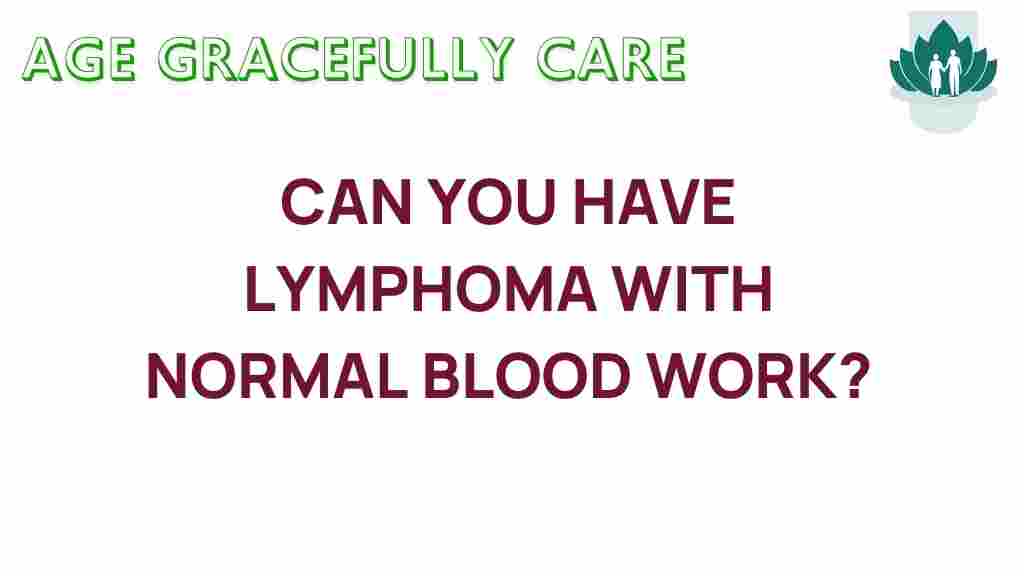The Surprising Truth: Can You Have Lymphoma with Normal Blood Work?
Lymphoma is a type of cancer that affects the lymphatic system, which is a crucial component of our immune system. As patients and healthcare providers strive for accurate cancer diagnosis, the relationship between lymphoma and blood work often comes into question. Many people assume that normal blood work means they are free from serious health conditions like lymphoma. However, this assumption can sometimes be misleading. In this article, we will explore the complexities of diagnosing lymphoma, the importance of health awareness, and the potential for hidden conditions that may not show up in standard blood tests.
Understanding Lymphoma
Lymphoma is primarily categorized into two main types: Hodgkin lymphoma and non-Hodgkin lymphoma. Both types originate in the lymphocytes, a type of white blood cell crucial for fighting infections. Understanding the symptoms and risk factors associated with lymphoma is essential for early detection and effective treatment.
- Symptoms of Lymphoma:
- Swollen lymph nodes
- Unexplained weight loss
- Fever or night sweats
- Fatigue
- Itchy skin
- Risk Factors:
- Age (risk increases with age)
- Weakened immune system
- Family history of lymphoma
- Certain infections (e.g., Epstein-Barr virus)
The Role of Blood Work in Cancer Diagnosis
Blood work plays a significant role in the evaluation of potential health issues, including cancer diagnosis. Routine blood tests can provide valuable information about a patient’s overall health and help detect anomalies that may indicate cancer or other diseases.
Common blood tests used in the assessment of lymphoma include:
- Complete Blood Count (CBC): This test measures the levels of various blood cells, including red blood cells, white blood cells, and platelets.
- Lactate Dehydrogenase (LDH): Elevated LDH levels can indicate tissue damage and are often associated with lymphoma.
- Basic Metabolic Panel: This test checks for electrolyte imbalances and kidney function.
Despite the utility of these tests, it is crucial to understand that normal blood work does not rule out lymphoma. There are several reasons for this, which we will explore further.
Can You Have Lymphoma with Normal Blood Work?
Yes, it is indeed possible to have lymphoma even if your blood work comes back normal. This can be surprising for many patients, as they might expect that any serious condition would show up in routine tests. Here are several reasons why lymphoma may not be detected through blood work:
- Early Stages of Lymphoma: In the early stages of lymphoma, blood tests may not reveal any abnormalities. Many patients may not exhibit symptoms until the disease has progressed.
- Types of Lymphoma: Some forms of lymphoma, particularly indolent (slow-growing) non-Hodgkin lymphoma, may not produce significant changes in blood parameters.
- Localized Disease: If lymphoma is localized to lymph nodes or other tissues without affecting the blood system, the blood tests may appear normal.
- Hidden Conditions: Certain individuals may have hidden conditions that do not manifest during routine blood tests but still require further investigation.
When to Seek Further Evaluation
Understanding your body and knowing when to seek medical advice is crucial. If you experience any of the symptoms associated with lymphoma, even with normal blood work, consider the following steps:
- Consult a Specialist: If you have persistent symptoms, a referral to a hematologist or oncologist may be necessary for a more detailed evaluation.
- Request Imaging Tests: Additional tests such as CT scans, PET scans, or MRIs can provide insights into lymph nodes and other tissues that may not be visible in blood work.
- Consider a Biopsy: A biopsy of swollen lymph nodes or other affected areas may be required to confirm or rule out lymphoma.
Patient Experience and Advocacy
For patients navigating the complexities of cancer diagnosis, understanding the limitations of blood work and advocating for oneself is vital. Many patients report feeling frustrated when their symptoms are dismissed due to normal blood test results. Here are some tips for patients:
- Keep a Symptom Journal: Documenting symptoms over time can help provide a clearer picture to your healthcare provider.
- Ask Questions: Don’t hesitate to ask your doctor about the possibility of lymphoma or other conditions, even with normal blood results.
- Seek Second Opinions: If you feel that your concerns are not being addressed, consider seeking a second opinion.
Troubleshooting: What to Do Next
If you are experiencing symptoms but your blood work is normal, here are steps you can take to troubleshoot your health concerns:
- Schedule a Follow-Up Appointment: Discuss your symptoms with your healthcare provider and express your concerns about lymphoma.
- Explore Additional Testing: Work with your doctor to determine if more specialized tests are warranted based on your symptoms.
- Consider Lifestyle Factors: Reflect on lifestyle choices that may contribute to your symptoms, such as stress, diet, or physical activity.
Health Awareness and Education
Increasing awareness about lymphoma and the importance of early detection can save lives. Healthcare providers and patients alike should focus on:
- Education: Learning about lymphoma symptoms and risk factors can help patients advocate for themselves.
- Community Support: Engaging with support groups can provide emotional support and share valuable information.
- Regular Check-Ups: Routine health screenings can help catch potential issues early, even if blood work appears normal.
For more information about lymphoma and patient experiences, you can visit the American Cancer Society.
Conclusion
In conclusion, while blood work is an essential tool in the cancer diagnosis process, it should not be the sole indicator of health. It is entirely possible to have lymphoma with normal blood work, making it crucial for individuals to remain vigilant about their health and seek further evaluation when symptoms persist. Understanding the nuances of lymphoma, advocating for oneself, and fostering health awareness are key components in navigating the complexities of cancer diagnosis. Stay informed, stay proactive, and remember that your health is a priority.
For additional resources and support, please check out this link.
This article is in the category Health and created by AgeGracefullyCare Team
